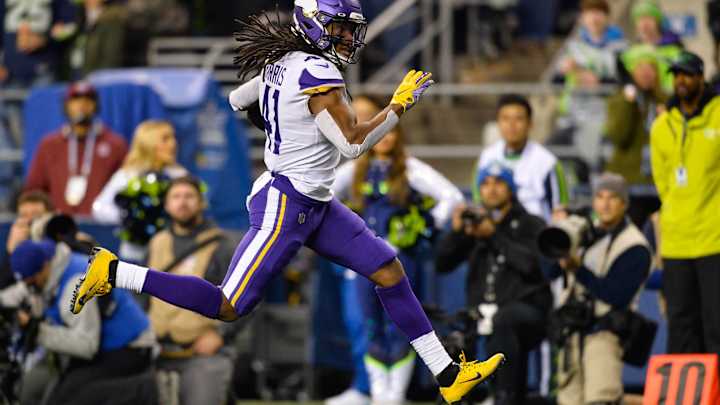What's Next for Anthony Harris and the Vikings?

Vikings safety Anthony Harris signed his franchise tender on Sunday, making it all but certain that he'll be in Minnesota for at least the 2020 season. But what does this news actually mean, and what's next for Harris and the Vikings moving forward?
Signing the tender doesn't change much when it comes to the ongoing negotiations over a long-term contract between Harris's agents and the Vikings. However, it removes the possibility that Harris would hold out to start the 2020 season, which always seemed unlikely given his personality and his status as a former undrafted free agent.
Harris didn't have to sign this tender as the two sides continue negotiations, but doing so gives him a certain level of financial security. It guarantees that, at the very least, he will officially earn $11.44 million on the franchise tag in 2020. That's more than double his career earnings of $5.3 million through his first five seasons, over $3 million of which came last season.
Now, the two sides have until July 15th at 3 p.m. central time to work out a long-term deal. That is the NFL's "deadline for any club that designated a Franchise Player to sign such player to a multiyear contract or extension," per the NFL Operations website. "After this date, the player may sign only a one-year contract with his prior club for the 2020 season, and such contract cannot be extended until after the club’s last regular season game."
Harris has made it clear that he wants to sign a multiyear deal to stay in Minnesota for the foreseeable future. "Minnesota has become home and is where I want to continue to develop as a player having only scratched the surface," he wrote in his post on social media announcing that he had signed the tender. If Harris were to play the 2020 season on the franchise tag without a long-term deal, there would be the risk of a major injury or other factors that could significantly diminish his payday in free agency in 2021. Harris would also be 29 at that time, which could reduce his earning potential.
However, it's also possible that Harris will have another highly successful year in 2020 while on the tag and would then be in line for a similar payday next offseason from whatever team spent the most for his services. Kirk Cousins recently made headlines when he addressed Dak Prescott's contract negotiations by saying that "the franchise tag can be your friend."
“I don’t think it’s something to be disappointed with," Cousins said. "I think it enables you to be well-compensated, and deservedly so, for the upcoming season. Then, I always say the cream will rise to the top. If you’re good enough, the cream’s going to rise to the top, and you’re going to get compensated the way you want to.''
As things stand, the $11.44 million Harris would make on the tag is tied for the fifth-highest salary among NFL safeties in 2020, ahead of teammate Harrison Smith, who will make $10.75 million in the fourth year of a five-year extension he signed back in 2016.
The Vikings now have to decide if it's worth it to sign Harris to a lucrative extension. He is clearly an extremely talented player and a great homegrown story, but does it make sense to have two highly-paid safeties going forward? Mike Zimmer said earlier this offseason that "if you put up the positions most important on defense it's probably not going to be safety," which seemed to suggest at the time that the team was preparing to let Harris walk in free agency. Smith will be a free agent in 2022, so they'll also have to make a decision with him in the not-too-distant future.
The argument in favor of keeping Smith and Harris together in the future is that not only are they the league's best safety duo, but they can provide experience and stability in a secondary that is relying heavily on young cornerbacks, including rookies Jeff Gladney and Cameron Dantzler.
The Vikings do have around $8 million in projected cap space after they officially sign their rookie class, so the money is there to lock up Harris long-term. However, another factor to consider is that they're also in negotiations for a major contract extension with running back Dalvin Cook.
It's also still possible that the Vikings could trade Harris, though that seems highly unlikely at this point given that talks with multiple teams broke down earlier this offseason.
It will be fascinating to see how this all plays out before the July 15th deadline.
Check out the video at the top of this page to watch me discuss Harris signing the franchise tender – and what comes next – with Sports Illustrated video host Madelyn Burke.
Join the conversation at InsideTheVikings by clicking the follow button in the upper right-hand corner of this page (mobile users, tap the bell icon), and follow @WillRagatz on Twitter.

Will Ragatz is a senior writer for Vikings On SI, who also covers the Twins, Timberwolves, Gophers, and other Minnesota teams. He is a credentialed Minnesota Vikings beat reporter, covering the team extensively at practices, games and throughout the NFL draft and free agency period. Ragatz attended Northwestern University, where he studied at the prestigious Medill School of Journalism. During his time as a student, he covered Northwestern Wildcats football and basketball for SB Nation’s Inside NU, eventually serving as co-editor-in-chief in his junior year. In the fall of 2018, Will interned in Sports Illustrated’s newsroom in New York City, where he wrote articles on Major League Baseball, college football, and college basketball for SI.com.
Follow WillRagatz